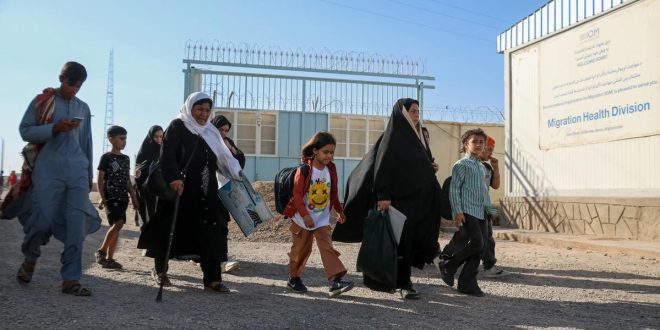AT Kabul: The forced return of Afghan migrants from neighboring Iran and Pakistan continues at an alarming rate, with 873 families deported or voluntarily repatriated between March 15 and March 21, according to data compiled by Amu from statements issued by the Taliban-controlled government.
Iran accounted for the overwhelming majority of deportations, expelling 837 Afghan families over the past week. Meanwhile, 36 families were removed from Pakistan, either forcibly or voluntarily, during the same period.
According to the data, 36 families crossed into Afghanistan from Pakistan via the Spin Boldak border crossing in Kandahar Province. From Iran, 226 families entered through the Silk Bridge crossing in Nimroz Province, while 611 families returned via the Islam Qala border in Herat Province.
The previous week, between March 8 and March 14, Iran and Pakistan deported a total of 674 Afghan refugee families, underscoring an escalating crackdown on undocumented Afghans in both countries.
Iran and Pakistan have long been home to millions of Afghan refugees, with official estimates suggesting that over 4.5 million Afghans reside in Iran and more than 3.1 million in Pakistan. Many of them now face the threat of deportation as both governments tighten border enforcement. For those being forced back, however, the situation is dire.
In both Iran and Pakistan, Afghan refugees report increasing harassment, arbitrary detentions, and limited access to basic services. In Pakistan, the government has accelerated its expulsion campaign, citing security concerns, while in Iran, deportations have surged amid deteriorating economic conditions and rising anti-migrant sentiment.
For those who return to Afghanistan, the future remains bleak. Under Taliban rule, the country is plagued by economic collapse, lack of infrastructure, and limited humanitarian assistance. Many returnees arrive with no means of livelihood, struggling to secure food, shelter, and medical care in a country ill-equipped to absorb them.
International humanitarian organizations have repeatedly warned of the dire consequences of mass deportations, urging Iran and Pakistan to reconsider their policies and provide legal pathways for Afghan refugees to remain. But for thousands of families caught in the middle, there are few options left—except an uncertain future in a homeland still reeling from decades of conflict.
 Afghanistan Times
Afghanistan Times




